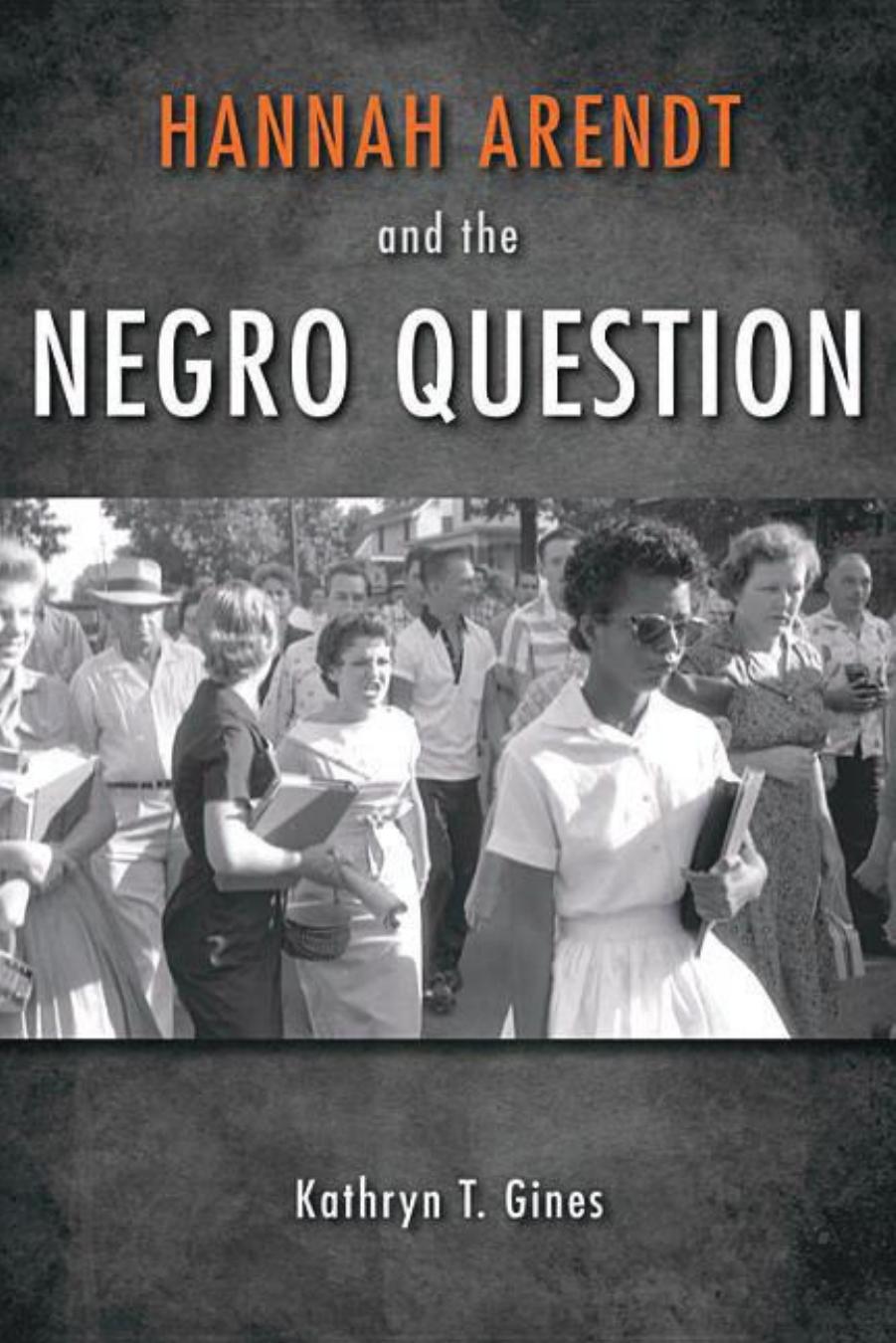Hannah Arendt and the Negro Question by Gines Kathryn T

Author:Gines, Kathryn T.
Language: eng
Format: epub, pdf
Publisher: Indiana University Press
Published: 2014-03-14T16:00:00+00:00
6 “Only Violence and Rule over Others Could Make Some Men Free”
THE THEME OF violence can be traced throughout Arndt’s major political writings, such as The Human Condition and On Revolution, where she draws connections between war, violence, and necessity (or liberation from necessity); The Origins of Totalitarianism, where she examines Europe’s use of violence in concentration camps and imperialist massacres in Africa; and of course, On Violence, where she condemns the violence of the Black Power movement and of anti-colonialism. Patricia Owens notes in Between War and Politics that Arendt “was the theorist of political speech and action and claimed on numerous occasions that violence was mute and brought death to politics. Yet, we also find in Arendt’s work praise for the experience of war as the quintessential moment for humans to be most fully alive and political.”1 In this chapter I examine this double-sided approach to violence by Arendt. More specifically, I parse how Arendt presents violence uncritically in some contexts and hypercritically in other contexts.
In The Human Condition there is a troublesome relationship between violence and the private and public spheres, or the use of violence to leave the private realm and to make entry into the political realm possible. Likewise in On Revolution Arendt attempts to situate violence outside of the political realm even while acknowledging the constitutive role of violence in the creation of a political realm. Additionally, in The Jewish Writings Arendt’s argument for a Jewish army is made in explicitly political terms—linking self-defense to fighting for freedom and equal rights. Yet in On Violence Arendt critiques Fanon and Sartre for their stances on anticolonial violence in The Wretched of the Earth (1963) and Critique of Dialectical Reason, volume 1 (1960). Arendt, Fanon, and Sartre are each clear that European expansion in Africa was violent. But Arendt presents an uncritical view of the violence against Africans deployed by Europeans (in Origins), while Fanon and Sartre critique the violent colonial system, taking into account the role of violence in establishing the colonial system and the corresponding role of revolutionary counterviolence against this system.2 Using Arendt against herself, I juxtapose her presentation of the violence used to master necessity and to enter political space with her vehement critiques of the violence used by the colonized (whom she characterizes as violent). Arendt’s apologetics for European violence and her insistence on the formation of a Jewish army as a political issue, on the one hand, contrasted with her criticism of Sartre and Fanon concerning counter-violence, on the other, further confirms her biases.
“While Violence Can Destroy Power, It Can Never Become a Substitute for It”
Hannah Arendt’s distinction between violence and power can be added to the list of distinctions in her political thought, and we see it developed across several of her writings. In On Violence, Arendt draws distinctions between power, strength, force, authority, and violence, all of which she describes as ways by which man rules over man. According to Arendt, “power is the human ability to act in concert….
Download
Hannah Arendt and the Negro Question by Gines Kathryn T.pdf
This site does not store any files on its server. We only index and link to content provided by other sites. Please contact the content providers to delete copyright contents if any and email us, we'll remove relevant links or contents immediately.
The remains of the day by Kazuo Ishiguro(8945)
Tools of Titans by Timothy Ferriss(8346)
Giovanni's Room by James Baldwin(7299)
The Black Swan by Nassim Nicholas Taleb(7086)
Inner Engineering: A Yogi's Guide to Joy by Sadhguru(6775)
The Way of Zen by Alan W. Watts(6575)
Asking the Right Questions: A Guide to Critical Thinking by M. Neil Browne & Stuart M. Keeley(5737)
The Power of Now: A Guide to Spiritual Enlightenment by Eckhart Tolle(5723)
The Six Wives Of Henry VIII (WOMEN IN HISTORY) by Fraser Antonia(5484)
Astrophysics for People in a Hurry by Neil DeGrasse Tyson(5169)
Housekeeping by Marilynne Robinson(4420)
12 Rules for Life by Jordan B. Peterson(4292)
Double Down (Diary of a Wimpy Kid Book 11) by Jeff Kinney(4252)
The Ethical Slut by Janet W. Hardy(4232)
Skin in the Game by Nassim Nicholas Taleb(4223)
Ikigai by Héctor García & Francesc Miralles(4219)
The Art of Happiness by The Dalai Lama(4114)
Skin in the Game: Hidden Asymmetries in Daily Life by Nassim Nicholas Taleb(3973)
Walking by Henry David Thoreau(3938)
